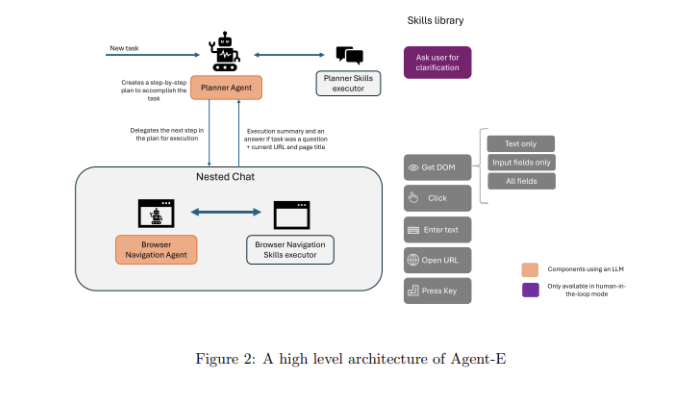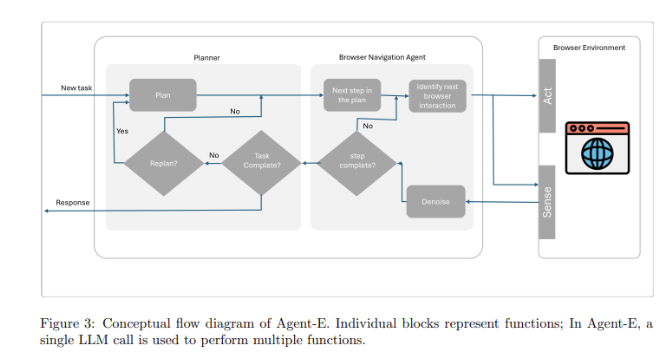The editor of Downcodes learned that Emergence AI company recently released a new intelligent web agent called Agent-E. Its task success rate is as high as 73.2%, which is 20% higher than before. Agent-E is designed to improve the efficiency of artificial intelligence in web navigation and complete complex online tasks more effectively, such as data retrieval, form filling, flight booking, etc. The emergence of this agent will undoubtedly bring users a more convenient and efficient network experience. Below, let’s take a closer look at Agent-E’s innovations.
According to the latest reports, Emergence AI company has launched a new intelligent web agent called Agent-E, with a success rate of 73.2%, an increase of 20% compared to the past. The new technology is designed to enable autonomous web navigation, allowing AI agents to complete complex online tasks more efficiently, from data retrieval and form submission to ordering the cheapest flights or booking accommodation.

Traditional web proxies are often inefficient and error-prone when dealing with the complexity and variability of modern web pages. They often fail to perform their tasks accurately because they cannot effectively handle the noisy and large HTML Document Object Models (DOMs). This inefficiency is an important obstacle to the deployment of autonomous web proxies in practical applications, where reliability and accuracy are crucial.
The research team at Emergence AI introduces Agent-E, a new web agent designed to overcome the shortcomings of existing systems. Agent-E adopts a layered architecture that divides the task planning and execution phases into two independent components: the planning agent and the browser navigation agent. This way each component can focus on its specific role, improving efficiency and performance. The planning agent splits user tasks into smaller subtasks and is executed by the browser navigation agent through advanced DOM refinement techniques.

Agent-E's approach includes several innovative steps to effectively manage noisy and large network content. The planning agent splits user tasks into smaller subtasks and assigns them to the browser navigation agent. The browser navigation agent uses flexible DOM refinement techniques to select the most relevant DOM representation for each task, reducing noise and focusing on task-specific information. Agent-E uses change observation to monitor state changes during task execution and provide feedback to enhance the agent's performance and accuracy.
Evaluated on the WebVoyager benchmark, Agent-E significantly outperforms previous state-of-the-art web proxy systems. Agent-E achieved a success rate of 73.2%, which is 20% higher than the previous plain text web page agent and 16% higher than the multi-modal web page agent. On complex sites like Wolfram Alpha, Agent-E improves performance by up to 30%. In addition to success rates, the research team also reported other metrics such as task completion time and error perception. Agent-E took an average of 150 seconds to successfully complete a task and 220 seconds for a failed task. Each task requires an average of 25 large language model calls, highlighting its efficiency and effectiveness.
Research conducted by Emergence AI represents a significant advance in the field of autonomous web navigation. By adopting a layered architecture and advanced DOM management technology to solve the inefficiency problems of current web proxy systems, Agent-E sets a new benchmark for performance and reliability. The findings demonstrate that these innovations can be applied to other areas of AI-driven automation beyond network automation and provide valuable insights into agent system design principles. Agent-E's success in achieving a 73.2% mission completion rate and efficient mission execution process highlights its potential to transform network navigation and automation.
Project entrance: https://top.aibase.com/tool/agent-e
### Highlights:
Emergence AI launches Agent-E: success rate 73.2%, an increase of 20%
Agent-E adopts layered architecture and DOM management technology
Significantly better than before in the WebVoyager benchmark
Agent-E's high success rate and efficient execution efficiency have set a new benchmark for intelligent web agent technology, and also indicate that artificial intelligence will have broader application prospects in the field of web automation in the future. The editor of Downcodes hopes that Agent-E can demonstrate its powerful capabilities in more fields.